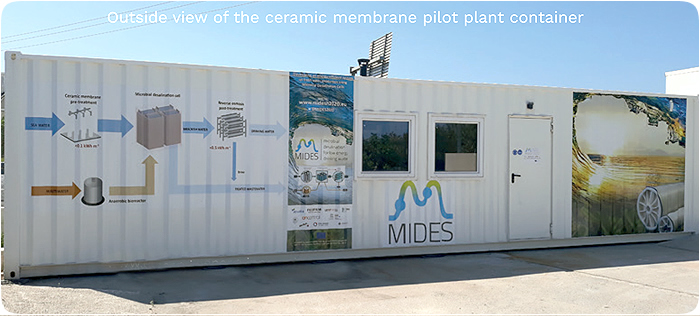In the attempt to overcome water scarcity, desalination with reverse osmosis (RO) has been a growing trend, with recent projects in the Middle East reaching a capacity of 1,000,000 m3/d per plant. But with an electricity consumption around 4kwh/m3, such plants need specific power stations dedicated only to run the high pressure pumps.
The EU-funded MIDES project addressed this challenge by developing and operating the world's first industrial demonstrator of a revolutionary technology based on microbial desalination cells (MDCs). It uses MDCs as a pretreatment for RO, enabling salt separation and water treatment to be conducted simultaneously.
MDCs employ specific bioelectroactive bacteria, called Geobacter to transform the energy contained in the organic matter present in wastewater into electrical energy. The potential difference created between the electrodes causes the separation of salts through the ionic exchange membranes, allowing to desalinate seawater and brackish water without external energy. The electricity needs are thus reduced by 92.3% compared to conventional processes for wastewater treatment (activated sludge) and desalination (RO).
From lab to pilot plant
Starting in 2016, at laboratories of IMDEA Water (Madrid, Spain), project partners overcame the current limitations of MDC technology such as low desalination rate, high manufacturing cost, and biofouling and scaling problems on membranes, and optimised the microbial electrochemical process. This was achieved through an exhaustive scaling up process involving novel anti-fouling ion exchange membranes and new carbon-based electrodes.
Researchers employed a circular economy approach in the MDCs using recycled plastics to configure the cells and stack. They also designed mathematical simulation models based on experimental results from the lab-scale, pre-pilot and pilot-scale stages of the project to optimise the process. In addition, new operational parameters and membrane cleaning protocols were implemented to enhance the bioelectrical reactions. The technology was patented by Aqualia and IMDEA Water (Ref. EP 3336064 A1).
Following successful scaling up, MIDES designed and built two MDC prototypes, each comprising one stack of 15MDC units with a total area of 0.4m2 per unit. Both prototypes can process thousands of litres brackish water and seawater per day with very low energy consumption.
The first MIDES pilot plant at Denia in Spain involved brackish water and waste water pre-treatment, the MDCs and low-pressure RO followed by postreatment to guarantee drinking water quality. The second site on the Spanish island of Tenerife used MDCs to carry out partial desalination of seawater and RO for subsequent post treatment to obtain drinking water from seawater without the use of external energy.
Benefits for rural and urban communities
By developing a combined water desalination and wastewater treatment system, MIDES can facilitate low-cost access to sanitation and safe drinking water according to national and EU regulations. It can also provide treated wastewater for reuse in irrigation and agricultural applications, thereby relieving pressure on current resources.
MIDES paves the way for smaller capacity decentralised plants, which purify wastewater with a positive energy balance. This means that with the help of MDCs, this technology can be implemented at remote industrial sites, farms and rural communities with limited power supply.
Furthermore, MIDES can benefit coastal sites by equipping them with comprehensive wastewater treatment plants that power water desalination facilities within intelligent management and control systems.

More information:
Coordinated by: Aqualia (Spain)
Funded under: H2020-EU.2.1.2.
Link: CORDIS factsheet
Project website: http://midesh2020.eu
Video: https://youtu.be/sQbVm8IXNto
This project has received funding from the European Union's Horizon 2020 research and innovation programme under grant agreement No. 685793.
* The sole responsibility of this publication lies with the author. The European Union is not responsible for any use that may be made of the information contained therein.